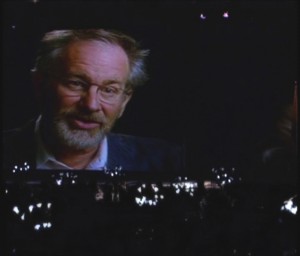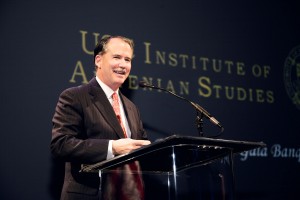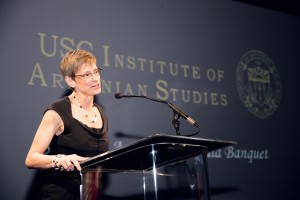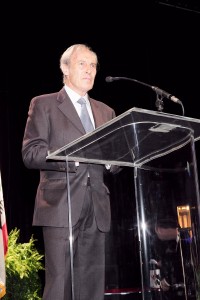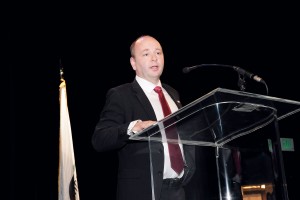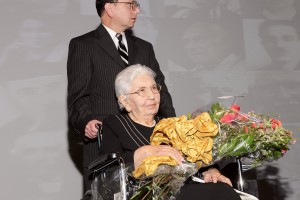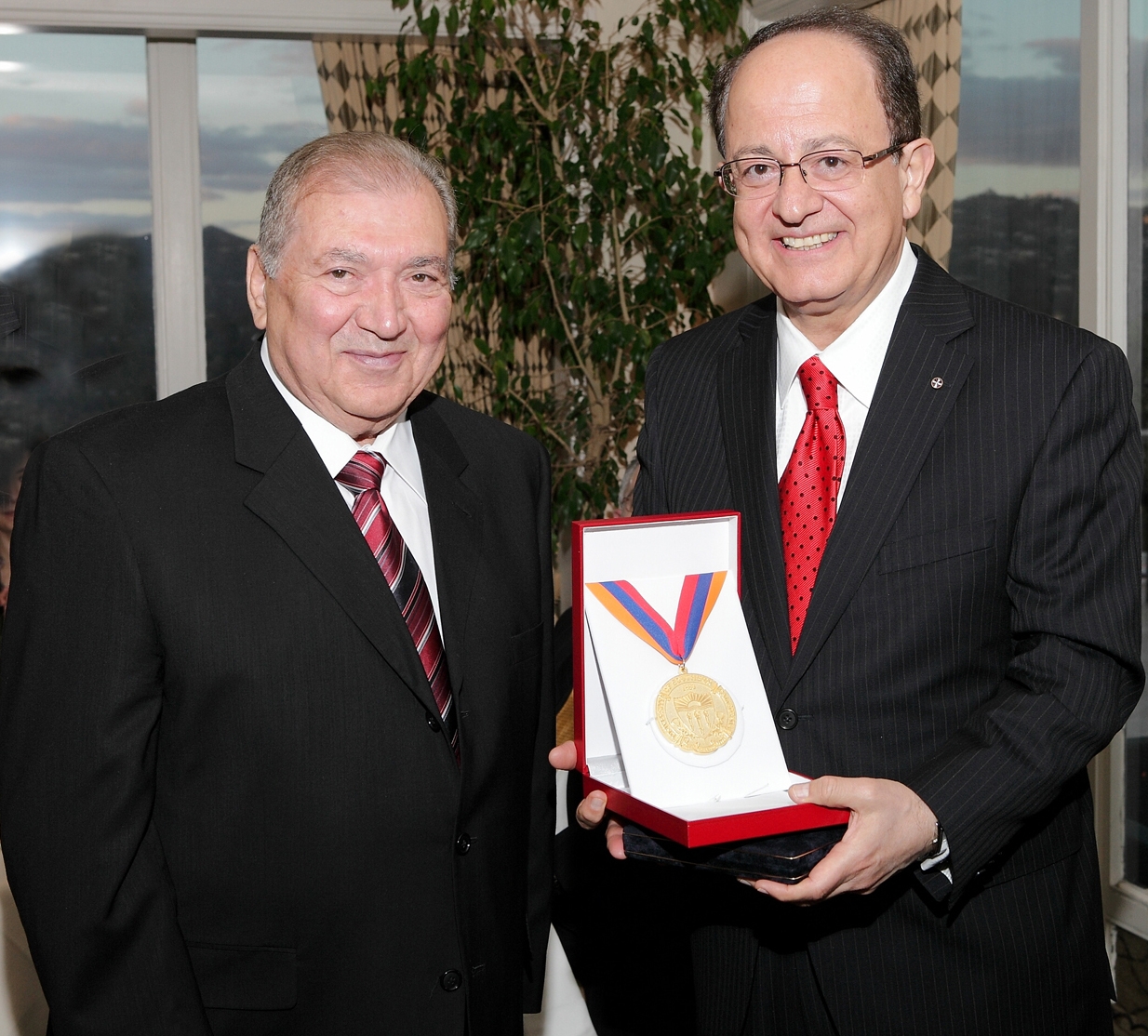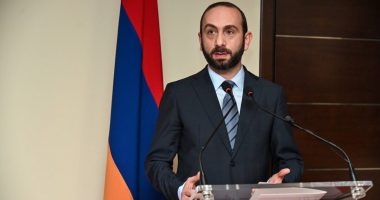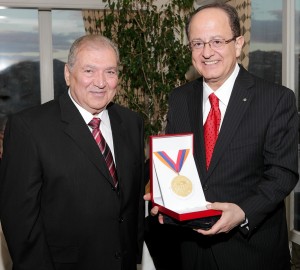

By Tamar Mashigian
LOS ANGELES, CA — The USC Institute of Armenian Studies’ Leadership Council proudly announced at its Seventh Anniversary Gala Banquet on Sunday, April 15, a $3 million endowment for a Chair in Contemporary Armenian Studies at USC by the Turpanjian Family.
With USC Provost and Senior Vice President for Academic Affairs Elizabeth Garrett in attendance and an audience of just under 1,000, the Institute’s Leadership also announced the establishment of a $2 million Armenian Genocide Studies Endowed Fund at USC. The total of the two funds, including previous endowment funds, means that Armenian studies programs at USC are supported by a $7 million endowed structure.
Jerry and Pat Turpanjian, with their daughter Lori Muncherian, stood center stage in the Beverly Hilton’s International Ballroom Sunday night, joined by fellow members of the Honorary and Leadership Councils: John Marshall Evans, Paul Ignatius, Mihran Agbabian, John Berberian, R. Hrair Dekmejian, Charles Ghailian, Vahe Karapetian, Varrant Melkonian, Gerald Papazian, Harut Sassounian, Sinan Sinanian, Dickran Tevrizian and Savey Tufenkian.
The April 15 event was organized to honor the USC Shoah Foundation Institute for Visual History and Education for championing the Armenian Genocide Digitization Project.
The second half of Sunday evening’s program focused on the USC Shoah Foundation Institute, represented in force at the International Ballroom, and the Armenian Genocide Digitization Project, and featured a videotaped message from Steven Spielberg.
“I’m really pleased that the USC Shoah Foundation Institute is being recognized tonight by the USC Institute of Armenian Studies Leadership Council,” Spielberg said in a videotaped message. “We are working together to preserve and to disseminate this collection of 400 interviews of survivors and witnesses gathered by Dr. J. Michael Hagopian and the Armenian Film Foundation for over 39 years. So I applaud them for their pioneering efforts and … for their tireless dedication.”
Spielberg established the Shoah Foundation in 1994 to record the stories of Holocaust survivors, and in 2006 the foundation became a part of the USC Dana and David Dornsife College of Letters, Arts & Sciences. The Shoah Foundation Institute’s Visual History Archive contains 52,000 Holocaust testimonies, and the digitized copies of documentary filmmaker J. Michael Hagopian’s interviews with Armenian Genocide survivors will be disseminated on the worldwide web by Shoah.
Hagopian, who founded the Armenian Film Foundation in 1979, was posthumously honored with a video presentation of his life. His daughter, Joanne Hagopian Eknoian, who accepted a medal in his honor, urged the audience to donate to the Armenian Film Foundation to help fund the digitization of Hagopian’s archive of 400 filmed eyewitness testimonies. The backdrop of the evening’s cinematic presentation was a mosaic of faces of Armenian Genocide survivors, testimony to Hagopian’s work to preserve their voices.
In addition to honoring the USC Shoah Foundation Institute and Hagopian, the Armenian Institute’s Leadership Council paid special tribute to Armin T. Wegner, the humanitarian who took the iconic photographs of the 1915 massacre of the Armenians and later wrote an open letter to Hitler to stop the Jewish Holocaust. Wegner’s son, Mischa, who traveled from Europe to be present at the April 15 event, gave a moving, poetic story about his father, whose crusade earned him the title of Righteous Among the Nations by Yad Vashem in 1967. Part of Wegner’s ashes were taken to Armenia in 1996.
The goal of the USC Armenian Institute’s Leadership Council is to bring together digital copies of all of the collections of interviews with Armenian Genocide survivors and eyewitnesses, essentially creating what may become the largest archive of Genocide eyewitness interviews in the world – proof of the Armenian Genocide.
USC Shoah Foundation Institute Director Dr. Stephen Smith’s eloquent remarks about Wegner and Hagopian concluded with the statement: ”What happened was a genocide – factually, historically. And anyone who wants to engage in a conversation about that is not engaging in controversy, they’re engaging in denial. And we don’t accept denial.”
The evening began with the USC Trojan Marching Band parting the crowds as they marched into the ballroom. The evening ended with a message of unity from filmmaker Carla Garapedian, Armenian Film Foundation Digitization Project Director: “Remember this day. It is the day we honor our survivors and witnesses – not by mourning, but by taking a step forward and exercising our power as a community. On this day, we shine a light on the darkness, we share these testimonies with the world, as part of an archive which will include the voices of survivors from other genocides, in one of the largest archives of its kind in the world. Remember this day. April 15, 2012. We are here. We survived. And on this day, we go global.”
